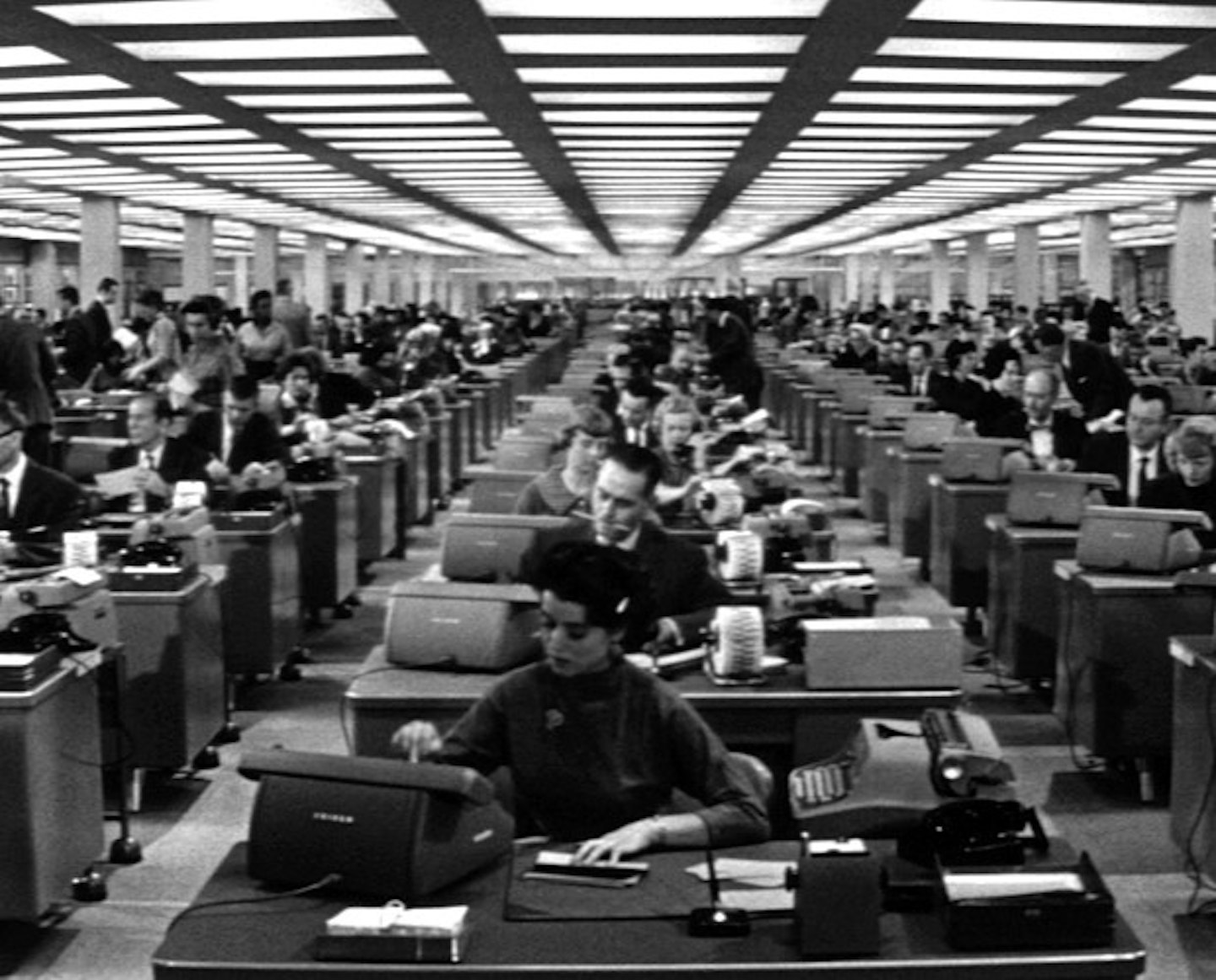‘I felt trapped in a full-time job. You have more security, but I prefer going to work knowing that it’s my choice,’ Jess DuPreez, 25, tells The Debrief. Three months ago she stopped working full-time for a marketing company. She now works there two days a week, spending the rest of her time as an assistant to performance artist Scottee or at Hunt & Darton, an art-driven pop-up café.
‘One day I could be buying eyelashes for a drag queen, the next I’m going to vintage shops and then other days I’m behind a desk building up my marketing skills,’ she says.
Now, you might tilt your head and wonder how Jess is paying the bills , how her organisation skills are faring, or what the long-term plan is. You’re not alone – in a recent YouGov study, younger people aged 18-24 were less likely than their 55-year-old-and-above counterparts to agree with the statement ‘Part-time workers are as capable of delivering/completing demanding pieces of work as full time workers are.’
Apparently we just don’t ‘get’ part-time work, or see it as a viable, long-term way of sustaining our lifestyle. Of course, the increase in zero-hours contracts over the last few years, where people are told on the day of work how much work they have to do, are to blame for some of our negative attitude towards part-time work. But we shouldn’t necessarily shy away from it as a concept, because 83 per cent of people in part-time work want to be in part-time work.
So maybe rather than seeing part-time work as a stop gap to full-time employment – something young people only do because they can’t get a full-time job – we need to start viewing it as a valid lifestyle choice. And a potentially lucrative and rewarding one at that.
A new study from the Office of of National Statistics finds that 8.7 million people in full-time work would love to go part-time.
In the Autumn Statement, George Osborne claimed that unemployment will be down to 5.4 per cent in the UK by the next general election (May 2015, fact fans). This prompted criticism that the number of people unwilfully in part-time work and working on zero-hours contracts skewed these figures.
Furthermore, it was pointed out that a disproportionate number of women (6.3 million to men’s 2.2 million) are working part time, which could be linked to men being ‘breadwinners’, or down to the fact that women have been hit harder by Government cuts to jobs as they make up 65 per cent of the public sector workforce.
READ MORE: In Defence Of Not Moving To London When You Graduate
However, a new study from the Office of of National Statistics done by TimeWise.co.uk (a part-time work job site) finds that 8.7 million people in full-time work would love to go part-time. And although 74 per cent of part-time workers are women, exactly the same proportion of these women (74 per cent) want to be working part-time. This is lower than the proportion of men who choose to go part-time, but where women are pushed into part-time work by circumstance, their ability to adapt to this new model of working could help them in the long run.
Women have proven themselves adept at shifting and remaking and sometimes contorting themselves to fit the times, and that very flexibility and responsiveness has come to define success in our era
The theories go that women are more likely to dedicate time to childcare, work in shift-friendly industries such as beauty, healthcare and the creative arts, or find it harder to feel entitled to that full-time job. But what starts off as a women’s only option is going to become the way we all work.
In Hanna Rosin’s The End Of Men, she explains that the reason women take on part-time roles isn’t always because they’re forced into them, but because they’re so much more adaptable than men – she says women are ‘Plastic’, and men ‘Cardboard’.
‘Women have proven themselves adept at shifting and remaking and sometimes contorting themselves to fit the times, and that very flexibility and responsiveness has come to define success in our era.
‘Men, by contrast, seem much more resistant and rigid,’ she adds.
But this could all be set to change because, after all, part-time work is the future. That’s what futurologist Ian Pearson says, anyway: ‘Artificial intelligence enables us to do more with our day with fewer people.
‘The people who won’t lose their jobs through this are those doing more human-oriented jobs, the ‘care economy’, where we implement more interpersonal skills in more industries. More people will end up doing part-time work. It might mean that you have less cash, but as costs [commuting, office rents, etc] will be driven down, you can do more with less.’
Sarah Lyall, a social policy researcher at think-tank the New Economics Forum, agrees with this sentiment, and is pushing for us to work 20-30 hours a week instead of 40-50: ‘For social, economic and environmental reasons. Countries such as Germany and Switzerland have much shorter average working ours than we do in the UK but they’ve got much stronger economies.’

‘Companies that have gone for flexible and shorter working hours say their staff have become more productive, there’s less of an emphasis on presenteeism [when you turn up no matter what, even if you’re ill and snotting everywhere] and more of a focus on what you want to achieve in your working day. You end up with a happy, satisfied, healthy, fulfilled workforce that is able to be committed to work while they’re there.’
So, if part-time work is the future, what will our future workers look like? Jess explains that she would ‘have been depressed and burned out’ had she continued full-time. And Cary Cooper, professor of Organisational Psychology and Health at Lancaster University, attests to this: ‘If the organisation is putting you on a short contract, that’s not going to make you terribly happy, but if you choose to do it, you really can benefit from it and do other things with your life.’
I have never felt so passionate, committed and happy in my career as I have done since working part time
Ravleen Beeston, 33, has been working part-time for eight years at Microsoft as head of client services & operations in advertising & online. She went part-time 11 months ago, and splits her week between work, looking after her young son and chairing a theatre production company, Rifco Arts. She says that doing a lot of different things with her week makes her feel ‘enriched and fulfilled by multiple things in my life. It, in turn, means I give more to each of those components.’
And on top of that, Ravleen, who makes up one of *TimeWise’*s top 50 part-time working executives and proves it is possible to work part time at top levels and be more productive. ‘I have never felt so passionate, committed and happy in my career as I have done since working part time. Knowing that I can have a very successful career while being able to fulfil all these other important aspects of my life makes me appreciate my work all that more,’ she says.
Liz Smith, 27, has been working part-time for the past three years but says, ‘There’s a stigma, because people assume my desk-job is my long-life ambition, when actually I’m happy being a receptionist here because it means I get to devote the rest of my time to acting and writing.’
Economically, part-time work (and not just the exploitation of zero hours work) can help companies, too. David Knight, partner at KPMG, says that letting staff go part-time not only increases their productivity, but helps out the company: ‘There is an ongoing war for talent, there is an increasing need for employers to be flexible and agile in having different sorts of employees who can help them be more efficient and more effective in the way they deliver their work.
‘Commercially and operationally, it makes a lot of sense for employers to make better use of part-timers as an important dimension of their workforce,’ he says.
Lynn Rattigan, deputy COO of EY, is a part-time worker and a major employer, who believes: ‘The best businesses need to embrace flexible working, not only to keep attracting the best and brightest talent, but genuinely because that’s where we’re heading as a working society.’
But before this happens, decisions need to be made and the culture needs to change. Jo Swinson, the minister for women and equalities explained last month: ‘Government has got a really important leadership role and I think there is still more to be done – particularly, I would say, around part-time working.
‘I think there is still a slight snobbishness about people who work part-time in senior roles.’
But it’s still pretty telling that she’s saying this within her remit as women’s representative; if part-time work is the future, it’s not only for women, just something that women, through coincidence, are getting used to long before men. As Sarah puts it: ‘Women can be leaders with this.’
It’s great, then, that the Department for Business, Innovation and Skills told The Debrief: ‘We want to change the culture around flexible working, so that it becomes the norm in many workplaces, not a special case. The latest extension of the right to request to all employees will give people the opportunity to have a conversation with their employer about a working pattern that suits them and the business.
‘This will also help employers, as modern businesses know that flexible working boosts productivity and staff morale, and helps them keep their top talent.’
With all of that in mind, we’re not saying you should up and leave your jobs right this very second, but maybe it’s worth reassessing how you actually get stuff done at work, and how much of your time you want to spend at a desk. The world of work is about as stable as a tightrope, but that could now make it the best time to jump off and try new stuff out.
As Jess puts it: ‘The chance of having a house is almost nil, the chance of saving for a pension is unachievable, as a young person, especially in London, you just live for the day and live to survive. And if you’re working full-time in a job you hate, you’re just not living as much.’
**Liked this? You might also be interested in: **
Follow Sophie on Twitter @sophwilkinson
Illustration: Beth Walrond
This article originally appeared on The Debrief.
